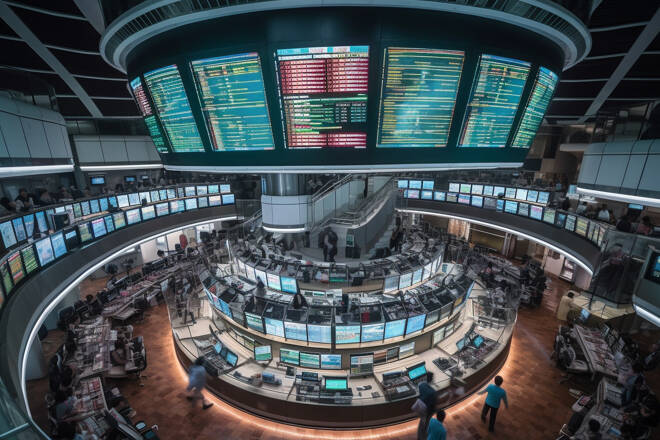Advertisement
Advertisement
Hang Seng Index, ASX 200, Nikkei 225: Focus Remains on China Measures
By:
After steps to bolster the Chinese equity markets, Hang Seng Index trends remain a focal point as investors await further stimulus measures from Beijing.
Highlights
- The Hang Seng Index ended the Tuesday session in positive territory, while the ASX 200 and the Nikkei ended the session in negative territory.
- Government measures and support from state-linked entities in China drove buyer demand for Hang Seng-listed stocks.
- On Wednesday, investors must consider overnight US Fed speeches, US corporate earnings, and the Asian economic calendar.
Overview of the Tuesday Session
On Tuesday, the Hang Seng Index bucked the broader market trend, closing the session in positive territory. The ASX 200 and the Nikkei ended the session in negative territory.
Hawkish Fed Chair Powell comments from Sunday, and the US ISM Services PMI numbers sank bets on a March Fed rate cut. The ISM Services PMI increased from 50.6 to 53.4 in January. Significantly, ISM Services Prices jumped from 57.4 to 64.0, with ISM Services Employment up from 43.3 to 50.5.
10-year US Treasury yields surged 3.38%, ending the day at 4.160%. The US equity markets reacted to the numbers. On Monday, the Nasdaq Composite Index and S&P 500 declined by 0.20% and 0.32%, respectively. The Dow ended the day down 0.71%.
However, Asian economic indicators also garnered investor interest. Household spending and wage growth numbers from Japan sent mixed signals.
Average cash earnings increased by 1.0% year-over-year in December after rising by 0.2% year-over-year in November. The upswing in wages could allow the Bank of Japan to begin discussions about rate cuts. However, household spending continued to disappoint. Household spending declined by 2.5% year-over-year in December after falling by 2.9% year-over-year in November.
For the ASX 200, a more hawkish-than-expected RBA stance affected buyer demand for ASX-listed stocks. Downward revisions to growth forecasts also impacted investor sentiment.
However, the Hang Seng Index avoided another loss. Investors responded to updates from China’s securities regulators and state-linked investment companies taking steps to shore up the Chinese equity markets.
Central Hujin Investment reportedly expanded its investment into exchange-traded funds. News of China President Xi Jinping plans to meet with financial regulators also buoyed the markets.
The Fed, Earnings, and China
On Wednesday, the Dow and S&P 500 ended the session up 0.37% and 0.23%, respectively. The Nasdaq Composite Index rose by 0.07%. 10-year US Treasury yields declined by 1.39%, providing market relief.
Economic data from the US had a limited impact on the US market session. The RCM/TIPP Economic Optimism Index declined from 44.7 to 44.0 for February. Consumer sentiment toward the economy declined despite tighter labor market conditions and a robust US economy.
Fed speakers continued to beat the hawkish drum on Tuesday. FOMC member Neel Kashkari needed more confidence inflation was moving toward target before cutting rates. FOMC Loretta Mester could not provide a timeline for rate cuts, saying the strong labor market and consumption would allow the Fed to consider more inflation data.
However, corporate earnings moved the dial. Eli Lilly (LLY) was the focal point on Tuesday, beating fourth-quarter forecasts.
On the Asian economic calendar, Ai Group private sector data for Australia garnered investor interest. The Ai Group Industry Index declined from -22.4 to -27.3 in January. Economists forecast a reading of -26.0. Later in the session, the RBA Chart Pack and Japanese Leading Economic Index numbers will draw interest.
Investors must also monitor stimulus chatter from Beijing, Chinese equity market interventions, and central bank commentary.
On Wednesday, the ASX 200 futures were up 55 points, while the Nikkei futures were down 110 points.
ASX 200
The ASX 200 declined by 0.58% on Tuesday. Losses were broad-based for the second consecutive session. Gold (XAU/USD) and mining stocks contributed to the losses, with tech stocks also a drag. The S&P ASX All Technology Index (XTX) fell 0.91%.
Northern Star Resources Ltd. (NST) and Evolution Mining Ltd. declined by 0.75% and 0.65%, respectively.
BHP Group Ltd (BHP) and Rio Tinto Ltd. (RIO) fell by 1.05% and 0.55%, respectively. Fortescue Metals Group Ltd. (FMG) ended the session down 2.94%.
Banking stocks had a mixed session. National Australia Bank Ltd. (NAB) and Commonwealth Bank of Australia (CBA) ended the day down 0.43% and 0.96%, respectively. Westpac Banking Corp. (WBC) fell by 0.12%. ANZ Group Holdings Ltd (ANZ) ended the session up 0.81%.
However, Woodside Energy Group Ltd (WDS) and Santos Ltd (STO) saw gains of 0.78% and 0.38%, respectively.
Hang Seng Index
The Hang Seng Index rallied 4.04% on Tuesday. Real estate and tech stocks contributed to the gains. The Hang Seng Mainland Properties Index (HSMPI) and Hang Seng Tech Index (HSTECH) saw gains of 4.82% and 6.75%, respectively.
Alibaba (9988) and Tencent (0700) rallied 7.57% and 4.01%, respectively.
Bank stocks also ended the day in positive territory. HSBC (0005) gained 1.06%. China Construction Bank (0939) and Industrial Commercial Bank (1398) ended the day up 3.25% and 3.16%, respectively.
The Nikkei 225
(Graph for reference purposes only)
The Nikkei declined by 0.53% on Tuesday.
Bank stocks ended the day in negative territory. Sumitomo Mitsui Financial Group Inc. (8316) and Mitsubishi UFJ Financial Group Inc. (8306) declined by 1.42% and 2.61%, respectively.
However, the main components of the Nikkei had another mixed session.
However, KDDI Corp. (9433) slid by 2.62%, with Sony Group Corp. (6758) falling by 1.52%. Softbank Group Corp. (9948) and Fast Retailing Co. Ltd. ended the day down 0.02% and 0.69%, respectively.
Tokyo Electron Ltd. (8035) bucked the trend, gaining 1.51%.
For upcoming economic events, refer to our economic calendar.
About the Author
Bob Masonauthor
With over 28 years of experience in the financial industry, Bob has worked with various global rating agencies and multinational banks. Currently he is covering currencies, commodities, alternative asset classes and global equities, focusing mostly on European and Asian markets.
Advertisement
